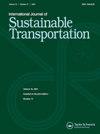Exploring and comparing the knowledge structures, collaborations and key themes of electric vehicle research in the environment domain
IF 3.9
3区 工程技术
Q2 ENVIRONMENTAL STUDIES
International Journal of Sustainable Transportation
Pub Date : 2025-03-04
DOI:10.1080/15568318.2024.2448002
引用次数: 0
Abstract
Using bibliometric analysis, science mapping, and thematic clustering, this study analyzed the knowledge structure, collaboration network, and key themes in electric vehicle (EV) research in the environment domain (ED) from 2010 to 2022. The analysis reveals rapid growth in knowledge production with continued influence over time. China, the United States, and the United Kingdom led environmental EV research during this period, with cluster analysis revealing associations between international collaboration patterns, geographical attributes, and research performance. Countries with strong qualitative research performance showed corresponding excellence in sustainability indices. Comparative analysis revealed that, among major journals and countries, articles in multidisciplinary journals (AMDJ) demonstrated stronger research performance, while articles in environment-specific journals (AESJ) were characterized by stronger research leadership. Analysis of EV research revealed several core themes, including climate change responses, energy management systems, battery and environmental sustainability, and renewable energy, alongside expanding research on charging infrastructure that parallels EV diffusion Furthermore, AESJ emphasized environmental, economic, and system-level perspectives of EVs, while AMDJ primarily addressed EV value chain development, infrastructure optimization, and challenges associated with technological implementation. This study represents the first thorough analysis of environmental EV research across sub-domains, one which identifies associations between research performance, collaboration, and sustainability measures. This thematic analysis demonstrates the interconnection between environmental themes and EV technological progress, highlighting the effect of environmental concerns on the direction of EV research. These findings provide implications for both scholarly research and policies associated with sustainable transportation development from an environmental perspective.
探索和比较环境领域电动汽车研究的知识结构、合作和关键主题
采用文献计量分析、科学图谱和主题聚类等方法,分析了2010 - 2022年环境领域电动汽车研究的知识结构、协作网络和关键主题。分析显示,随着时间的推移,知识生产的快速增长具有持续的影响。在此期间,中国、美国和英国引领了环境电动汽车的研究,聚类分析揭示了国际合作模式、地理属性和研究绩效之间的关联。质性研究表现较强的国家在可持续性指标上表现出相应的优异。对比分析发现,在主要期刊和国家中,多学科期刊(AMDJ)的论文表现出更强的研究绩效,而环境期刊(AESJ)的论文表现出更强的研究领导力。对电动汽车研究的分析揭示了几个核心主题,包括气候变化响应、能源管理系统、电池和环境可持续性以及可再生能源,同时扩大了与电动汽车扩散平行的充电基础设施的研究。此外,AESJ强调了电动汽车的环境、经济和系统层面的观点,而AMDJ主要关注电动汽车价值链发展、基础设施优化。以及与技术实施相关的挑战。该研究首次全面分析了跨子领域的环境电动汽车研究,确定了研究绩效、合作和可持续性措施之间的关系。这一专题分析展示了环境主题与电动汽车技术进步之间的联系,突出了环境问题对电动汽车研究方向的影响。这些发现从环境的角度为可持续交通发展的学术研究和相关政策提供了启示。
本文章由计算机程序翻译,如有差异,请以英文原文为准。
求助全文
约1分钟内获得全文
求助全文
来源期刊
CiteScore
8.90
自引率
2.60%
发文量
56
期刊介绍:
The International Journal of Sustainable Transportation provides a discussion forum for the exchange of new and innovative ideas on sustainable transportation research in the context of environmental, economical, social, and engineering aspects, as well as current and future interactions of transportation systems and other urban subsystems. The scope includes the examination of overall sustainability of any transportation system, including its infrastructure, vehicle, operation, and maintenance; the integration of social science disciplines, engineering, and information technology with transportation; the understanding of the comparative aspects of different transportation systems from a global perspective; qualitative and quantitative transportation studies; and case studies, surveys, and expository papers in an international or local context. Equal emphasis is placed on the problems of sustainable transportation that are associated with passenger and freight transportation modes in both industrialized and non-industrialized areas. All submitted manuscripts are subject to initial evaluation by the Editors and, if found suitable for further consideration, to peer review by independent, anonymous expert reviewers. All peer review is single-blind. Submissions are made online via ScholarOne Manuscripts.

 求助内容:
求助内容: 应助结果提醒方式:
应助结果提醒方式:


